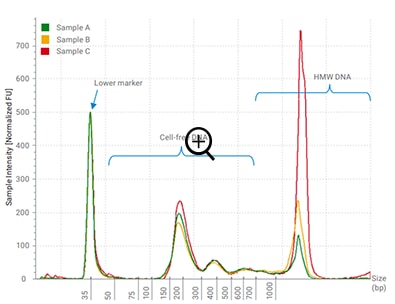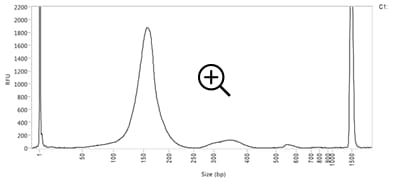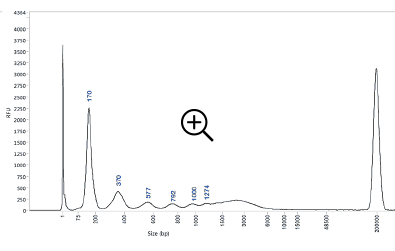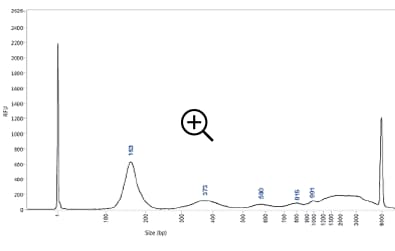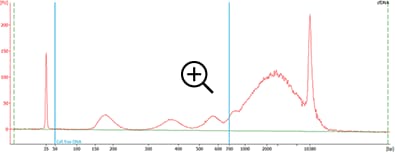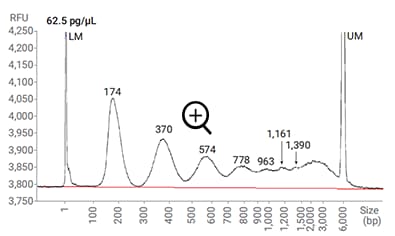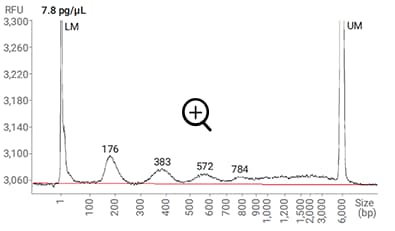Cell-free DNA Analysis for Sensitive Downstream Applications

What is cfDNA?
Cell-free DNA (cfDNA) refers to free-circulating DNA fragments, outside the cell, in plasma or tissues. As the source of nucleic acid samples for study in multiple areas of human disease research, cfDNA is most notably used in cancer, and oncology research. The study of cfDNA is relevant to efforts that improve less-invasive, ‘liquid biopsy’ applications, tumor progression, and studies to improve early detection.
Typically, cfDNA consists of shorter fragments, including DNA wrapped around nucleosomes and DNA of differing lengths linking nucleosomes, with degradation of the linkers between nucleosomes (Figure 1). Thus, electrophoretic separations of cfDNA often display three types of fragments: mononucleosome (~165 bp), dinucleosome (~350 bp), and tri-nucleosome (~565 bp).
Since cfDNA can be extracted from bodily fluids, it provides a valuable, less-invasive resource for genetic information. This can be used as the source of the sample for downstream genetic analysis, such as next-generation sequencing. However, it’s vital to first ensure that the sample is of requisite quality to yield a result. Performing a quality assessment of the specimens before downstream genetic analysis is key to this. This stage saves time and resources, and minimizes sample consumption. Separating and quantifying cfDNA is one of the quickest methods to help assess cfDNA samples.
When assessing cfDNA sample integrity, researchers anticipate that samples likely contain a heterogenous combination of one to six or more fragment sizes, making fragment analysis challenging. Analyzing cfDNA samples to ensure that they are of sufficient quality and quantity for subsequent sequencing can save significant time and resources.
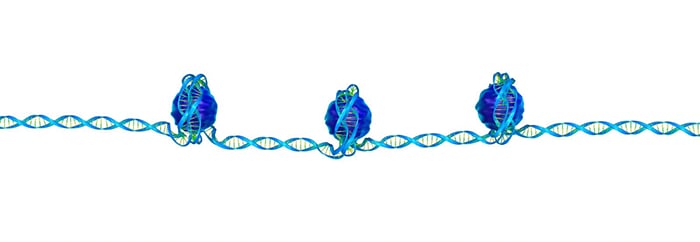
Representative image of cfDNA, with a strand of DNA wrapped around a series of nucleosomes.
To reliably quantify, size, and qualify cfDNA for downstream applications, high detection sensitivity, and separation by size are required. Successful sequencing of cfDNA has been enabled by continuous improvements to NGS technologies.
Agilent provides several solutions for cfDNA quality analysis with the automated electrophoresis portfolio, overcoming workflow challenges to ensure high-quality NGS libraries. Agilent’s instruments provide the sensitivity and resolution required to reliably quantify, size, and qualify cfDNA fragments, with advantages in throughput, sensitivity, speed, and resolution.
For Research Use Only. Not for use in diagnostic procedures.
TapeStation Systems
Fast, Automated Electrophoresis with Agilent ScreenTape Assay
High molecular weight (hmwDNA) contamination can affect downstream NGS library preparation and sequencing quality.
The Cell-free DNA ScreenTape assay for the TapeStation systems provides fast, automated, and reliable digital assessments of cfDNA. The assay provides accurate sizing and quantification of cfDNA from 50 to 800 bp, with input concentrations as low as 20 pg/µl.
This allows for quantification of the cfDNA fragments of interest independent of any high molecular weight contaminating fragments with the quality metric, %cfDNA. With this metric, users can objectively qualify cfDNA and be confident in the accuracy of downstream NGS library preparation.
Electropherogram overlay of cfDNA samples with differing sample quality. Sample A (green, 72 %cfDNA) shows low abundance of hmwDNA material >700 bp, reflecting the highest quality of the sample set. Sample B (orange, 57 %cfDNA) has a lower quality because it contains a higher amount of HMW material. Sample C (red) displays the lowest quality of 41 %cfDNA, due to a significant amount of HMW material.
For Research Use Only. Not for use in diagnostic procedures.
Fragment Analyzer Systems
Complete Portfolio of Fragment Analysis Solutions
Achieve reliable results with precise quantification. Agilent offers a comprehensive portfolio of fragment analysis solutions covering small, large as well as NGS fragments.
Fragment Analysis Solutions For Smaller DNA Fragments
The HS Small Fragment kit (p/n DNF-477) with a Fragment Analyzer system confidently sizes and quantifies mono-, di-, and tri-nucleosome cfDNA fragments with high separation resolution. The kit’s small sizing range (from 50 to 1,500 bp) is perfect for reliable sizing and quantification of small DNA fragments, and is well suited for analysis of cfDNA.
Carrier RNA occasionally used in extraction does not interfere with cfDNA sample quality analysis on the HS Small Fragment kit, allowing for accurate quantification of the total sample.
This figure shows cfDNA separated with the HS Small Fragment kit. Capillary electrophoresis was performed on a Fragment Analyzer system equipped with a short capillary array, 33 cm.
Fragment Analysis Solutions For Larger DNA Fragments
The HS Large Fragment 50 kb kit (p/n DNF-464) with a Fragment Analyzer system offers complete separation of all three common cfDNA fragments. With a large sizing range of 75 through 48,000 bp, accurate and reliable sizing and quantification of each fragment is achieved. An advantage of the wide sizing range is complete separation of fragmented DNA from the cfDNA fragments, allowing for accurate quantification of the total cfDNA sample using smear analysis. The HS Large Fragment 50 kb kit also allows visualization of any possible cfDNA fragments larger than the tri-nucleosome fragment.
If your cfDNA samples contain a significant amount of smaller fragmented genomic DNA (gDNA), the HS Large Fragment 50 kb kit enables separation of tri-nucleosome cfDNA fragments from smaller fragmented gDNA.
Carrier RNA occasionally used in cfDNA extraction can interfere with cfDNA sample QC on the HS Large Fragment 50 kb kit, causing a small smear that overlaps with the tri-nucleosome fragment. The HS Large Fragment 50 kb kit is recommended for use in the absence of carrier RNA to completely separate and analyze cfDNA separate from any gDNA contamination.
This figure shows cfDNA with fragmented DNA separated with the HS Large Fragment 50 kb kit. Capillary electrophoresis was performed on a Fragment Analyzer system equipped with a short capillary array, 33 cm.
Fragment Analysis Solutions For NGS Fragments
The HS NGS Fragment kit (p/n DNF-474) with the Fragment Analyzer system offers high resolution separation of the three cfDNA fragments with accurate sizing and quantification.
This reagent kit covers a size range larger than the cfDNA fragments allowing for separation from any fragmented gDNA. Complete separation from extraneous DNA allows for accurate quantification that is essential when cfDNA levels are utilized as a screening tool.
Some cfDNA extraction reagent kits utilize carrier RNA to help improve the isolation of cfDNA. The carrier RNA can be detected with the HS NGS Fragment kit and separates with the dinucleosome cfDNA peak. For reliable results when using this kit, it is recommended to avoid carrier RNA, or treat samples with RNase, to allow for complete separation of all cfDNA peaks.
This figure shows cfDNA with fragmented DNA separated with the HS NGS Fragment kit. Capillary electrophoresis was performed on a Fragment Analyzer system equipped with a short capillary array, 33 cm.
For Research Use Only. Not for use in diagnostic procedures.
Bioanalyzer System
High Sensitivity DNA assay
With the Bioanalyzer system, use the High Sensitivity DNA assay for analysis for cfDNA. The resolution of this system allows for the separation of the three major cfDNA peaks, apart from any high molecular weight (HMW) DNA present in the sample.
For yield and purity analysis of the cfDNA subcomponents, a region analysis allows you to determine the percent of the total sample that is cfDNA. When isolated from common extraction kits – including those that use carrier RNA – cfDNA is compatible with the Bioanalyzer High Sensitivity DNA assay.
This figure shows a cell-free DNA sample analyzed with the High Sensitivity DNA assay on a Bioanalyzer system. The region highlighted in the electropherogram with a smear range set from 50 to 700 bp (blue lines) indicates the mononucleosome, dinucleosome, and tri-nucleosome peaks, separated from the hmwDNA.
For Research Use Only. Not for use in diagnostic procedures.
Femto Pulse System
Ultrasensitive and precise NGS Kits for Complete Separation
Sample conservation is a priority when analyzing precious and low concentration samples. The Ultra Sensitivity NGS kit (p/n FP-1101) for the Femto Pulse system offers separation of low concentration smear levels, with an input concentration range of just 5 pg/µL to 250 pg/µL. The reagent kit covers a broad sizing range from 100 to 6,000 bp that enables complete separation of cfDNA fragments.
For example, the Ultra Sensitivity NGS kit was demonstrated to separate seven cfDNA fragments at a concentration of 62.5 pg/µL, with complete separation of the first three fragments down to 7.8 pg/µL. Complete separation of fragments enables the precise and dependable sizing and quantification required for comparison of cfDNA levels in screening assays.
It is recommended to avoid carrier RNA, or treat samples with RNase, when analyzing samples with this kit. This allows for complete separation of all cfDNA peaks and achieves reliable DNA sizing and quantification.
For Research Use Only. Not for use in diagnostic procedures.
A range of solutions for accurate cfDNA sample quality assessment
The automated electrophoresis instruments from Agilent provide accurate and versatile analysis of DNA and RNA samples, and also offer robust solutions for cfDNA sample quality analysis. Select the instrument platform best suited for your laboratory throughput, sensitivity, and sample size range needs. The following table offers the recommended reagents kits best suited for cfDNA sample quality assessment for use with each platform.
| Instrument | Part Number(s) | Reagent Kit Name | Sizing Range | Qualitative Range |
|---|---|---|---|---|
| TapeStation systems | 5067-5630 (ScreenTape) 5067-5631 (Reagents) |
Cell-free DNA ScreenTape | 50 to 800 bp | 100 to 4,000 pg/µL %cfDNA functional: 100 to 5,000 pg/µL1 |
| Fragment Analyzer systems | DNF-477-0500 DNF-477-1000 |
HS Small Fragment kit | 50 to 1,500 bp | 100 to 5,000 pg/µL2 |
| DNF-474-0500 DNF-474-1000 |
HS NGS Fragment kit | 100 to 6,000 bp | 50 to 5,000 pg/µL2 | |
| DNF-464-0500 | HS Large Fragment 50 kb kit | 75 to 50,000 bp | 50 to 5,000 pg/µL2 | |
| Bioanalyzer system | 5067–4626 | High Sensitivity DNA kit | 50 to 7,000 bp | 100 to 10,000 pg/µL2 |
| Femto Pulse system | FP-1101-0275 | Ultra Sensitivity NGS kit | 100 to 6,000 bp | 25 to 250 pg/µL2 Detection: 5 to 250 pg/µL1,2 |
1 Qualitative detection range
2 Concentration range determined with DNA smears
For Research Use Only. Not for use in diagnostic procedures.
Read more about cfDNA sample QC in our application notes
Performance Characteristics of the Cell-free DNA ScreenTape AssayThe Agilent Cell-free DNA ScreenTape assay was developed for cfDNA quality analysis, providing reliable total DNA concentration and quantitative assessment of cfDNA subcomponents apart from hmwDNA.
Separation of cfDNA with the Agilent HS NGS Kit on the Agilent Fragment Analyzer SystemsThe Agilent 5200 Fragment Analyzer system offers excellent resolution and reliable sizing of circulating cell-free DNA (cfDNA).
cfDNA Separated on the Agilent Femto Pulse SystemThe Agilent Femto Pulse system and the Ultra-Sensitivity NGS kit offer unparalleled resolution and quality assessment of low concentrated cfDNA samples.
Accurate QC Analysis of cfDNA Using the Agilent Fragment Analyzer SystemThis application note compares cfDNA peak separation using two reagent kits and two different capillary arrays for the Agilent Fragment Analyzer system.
For Research Use Only. Not for use in diagnostic procedures.
